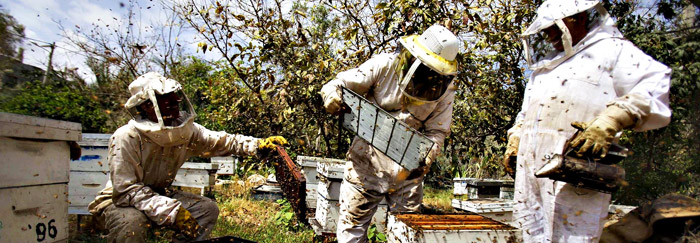The Honey Bee Health Coalition can point to a very active first year since its official launch during National Pollinator Week in 2014. The Coalition – a group of more than 30 diverse member organizations and agencies representing beekeeping, food, agriculture, government and conservation – has been busy as a bee accomplishing many important milestones in our first year and stands ready to continue building upon those successes.
Coalition’s Bee Healthy Roadmap Outlines Plan of Action & Coordination
The Coalition launched its website and newsletter to increase awareness and highlight challenges, solutions, and partner activities. In October 2014, the Coalition released its Bee Healthy Roadmap to improve honey bee health through collective action, identifying strategic priorities, goals, and action items. The following month, the Coalition provided formal recommendations to the U.S. Pollinator Health Task Force, prioritizing specific collaborative public-private efforts. In December, the Coalition began coordination with the Canada Bee Health Roundtable, leading to a presentation before the Roundtable in March of this year.
Investments, Tools, & Insights
The Coalition is working to put the best available hive management tools, techniques, and technologies in the hands of beekeepers. Coalition members from the private, civil, and public sector have worked together to support Varroacide screening and registration by raising awareness of the need and helping to identify potential candidate compounds for screening. The Coalition is also supporting the Bee Informed Partnership’s Tech Transfer Teams, which provide essential extension, education, and monitoring to beekeepers at all scales. Coalition members have collectively contributed or pledged more than $400,000 so far to Tech Transfer Teams as a result of its initial campaign in collaboration with Project Apis m. and the Bee Informed Partnership.
Coalition members are collaborating to ensure that honey bees — especially those in and around production agriculture — have access to a varied and nutritious diet. In March, the Coalition submitted its Forage Recommendations to USDA and the Pollinator Health Task Force. The recommendations prioritize and detail actions to increase and improve forage and habitat for honey bees and other pollinators through USDA conservation programs, public-private partnerships, and research. The Coalition also is working to help increase awareness and support for public-private forage development efforts like the Coalition-endorsed Honey Bee and Monarch Butterfly Partnership. The Coalition recommended this program to the White House and Pollinator Task Force as an excellent example of the type of public-private partnership that could substantially benefit honey bees and other pollinators.
The Coalition is also advancing communication, education, and solution-building across diverse stakeholders to control crop pests while safeguarding pollinator health. In May, the Coalition issued the Honey Bee Health Coalition Quick Guide to Reporting a Bee Kill Incident to acquaint beekeepers with the process of incident reporting, including how to report an incident to the State, the EPA, and pesticide manufacturers, and how to obtain help from non-governmental organizations. The Coalition partnered with Bee Culture Magazine to share this information with readers in its May 2015 issue. A prime example of a Coalition-incubated, member-led effort is the Bee Understanding Project, which works to engage stakeholders in empathy-building ‘job swaps’ and produce outreach and education materials to share with broad audiences.
These highlights show the Coalition hitting the ground running and busy as bees in its first 12 months. So, it was gratifying to see the Coalition specifically cited in the National Pollinator Health Strategy released last month by President Barack Obama’s Pollinator Health Task Force (see the Coalition’s response below) as an example of a public-private partnership and vehicle for collaboration, outreach, and education. As we mark National Pollinator Week 2015, we look forward to another year of successful, constructive activity and growing buzz as the Coalition and its members continue outreach on our priorities and messages.








